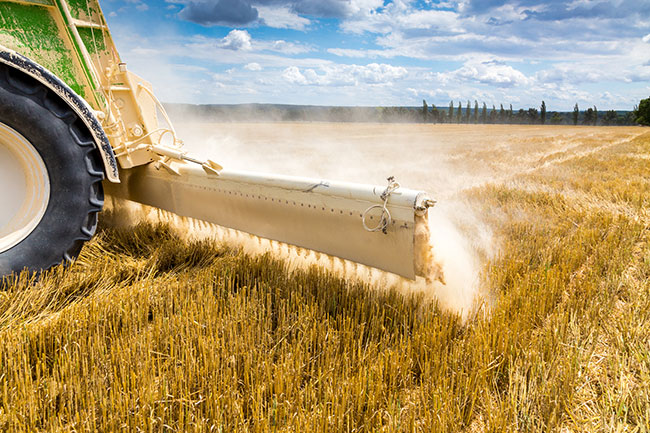| |
| |
 |
 |
| |
 |
|
@{mv_date_MMM d, yyyy}@ |
| |
|
| |
Some Western Canadian soils are naturally acidic. This week, discover more about managing soil acidity in Alberta and explore the soil health benefits of liming. You'll also learn about soybean response to phosphorus fertilization in Manitoba.
- Kaitlin Berger, west editor
|
|
| |
|
| |
 Grain Growers of Canada (GGC) and the Canadian Federation of Agriculture (CFA) expressed their concern following the Government of Canada's decisions to approve the Bunge Ltd. acquisition of Viterra Ltd. According to a statement by the GGC, the Competition Bureau and research conducted by the University of Saskatchewan calculated that this acquisition would cost grain farmers $770 million in revenues each year. While the approval does include divestments of six grain elevators in Western Canada and a $520 million investment commitment from Bunge, both GGC and CFA say these measures do not go far enough.
» Read more...
Grain Growers of Canada (GGC) and the Canadian Federation of Agriculture (CFA) expressed their concern following the Government of Canada's decisions to approve the Bunge Ltd. acquisition of Viterra Ltd. According to a statement by the GGC, the Competition Bureau and research conducted by the University of Saskatchewan calculated that this acquisition would cost grain farmers $770 million in revenues each year. While the approval does include divestments of six grain elevators in Western Canada and a $520 million investment commitment from Bunge, both GGC and CFA say these measures do not go far enough.
» Read more...
The Government of Canada and the Saskatchewan provincial government are providing $9.4 million in funding for crop-related research, in addition to $5.4 million in co-funding from industry partners for a combined total of $14.8 million this year. This funding will support 53 approved research projects on a variety of topics, including mapping soil carbon sequestration in Saskatchewan cropland, examining alternative genetic mechanisms for resistance to the wheat stem sawfly and studying the effects of a pea-based beverage on bone health to prevent osteoporosis and bone fracture.
» Read more...
Grain Growers of Canada (GGC), the Canadian Canola Growers Association and the Canadian Cattle Association - industry groups that represent over 130,000 Canadian farmers and ranchers - are calling on the federal government to reverse its decision to administer the proposed capital gains inclusion rate legislation. These groups continue to oppose the changes that undermine the policy intent of Bill C-208, particularly in terms of the continued uncertainty regarding future treatment of capital gains that adds costs, complexity and delays for farmers trying to navigate the intergenerational transfer of farm assets.
» Read more...
At the Crop Production Show on January 14, Bayer introduced FieldView Drive 2.0 to provide farmers with the opportunity to do more with precision equipment. This small plug-and-play device can help farmers monitor and record activities across different farm equipment - and the upgrade provides more processing power, data storage and in-field connection stability for improved data collection during planting, spraying and harvest.
» Read More...
|
| |
|
| |

Good news! The deadline for early bird pricing for this year’s Top Crop Summit has been extended until the end of January. That means you can still sign up today at a discounted rate.
Don't miss hearing the latest information on AI in agriculture, potassium fertility in prairie soils, waterhemp management and much more.
» Register now...
|
| |
|
| |
 Liming can successfully raise the pH level of soil when it starts to impede crop production. At the University of Alberta long-term Breton plots, average wheat yield from 2010 to 2021 was significantly increased with liming. Plots that did not receive lime since the 1930s had a pH of 5.3 and a yield of 36 bu/ac. Plots that were limed since had a pH of 6.0 and an average wheat yield of 50 bu/ac.
» Read more...
Liming can successfully raise the pH level of soil when it starts to impede crop production. At the University of Alberta long-term Breton plots, average wheat yield from 2010 to 2021 was significantly increased with liming. Plots that did not receive lime since the 1930s had a pH of 5.3 and a yield of 36 bu/ac. Plots that were limed since had a pH of 6.0 and an average wheat yield of 50 bu/ac.
» Read more... |
| |
 Limited research had been conducted on soybean response to phosphorus (P) fertilization in Manitoba. A three-year study at the University of Manitoba between 2013 and 2015 across Manitoba investigated the risk of reduced plant stand and seed yield due to toxicity from seed-placed P fertilizer and the impact of three different P fertilizer rates and three placements on plant stand and seed yield.
» Read More...
Limited research had been conducted on soybean response to phosphorus (P) fertilization in Manitoba. A three-year study at the University of Manitoba between 2013 and 2015 across Manitoba investigated the risk of reduced plant stand and seed yield due to toxicity from seed-placed P fertilizer and the impact of three different P fertilizer rates and three placements on plant stand and seed yield.
» Read More... |
| |
| |
|
| |

|
| |
| |







